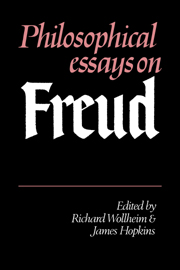Book contents
- Frontmatter
- Contents
- Introduction: philosophy and psychoanalysis
- 1 Conversations on Freud; excerpt from 1932–3 lectures
- 2 Freud, Kepler, and the clinical evidence
- 3 Critical empiricism criticized: the case of Freud
- 4 Freudian commonsense
- 5 Disposition and memory
- 6 On Freud's doctrine of emotions
- 7 The id and the thinking process
- 8 The bodily ego
- 9 Norms and the normal
- 10 On the generation and classification of defence mechanisms
- 11 Models of repression
- 12 Mauvaise foi and the unconscious
- 13 Self-deception and the ‘splitting of the ego’
- 14 Freud's anthropomorphism
- 15 Freud's anatomies of the self
- 16 Motivated irrationality, Freudian theory and cognitive dissonance
- 17 Paradoxes of irrationality
- Works of Freud cited
- Select bibliography
9 - Norms and the normal
Published online by Cambridge University Press: 01 October 2009
- Frontmatter
- Contents
- Introduction: philosophy and psychoanalysis
- 1 Conversations on Freud; excerpt from 1932–3 lectures
- 2 Freud, Kepler, and the clinical evidence
- 3 Critical empiricism criticized: the case of Freud
- 4 Freudian commonsense
- 5 Disposition and memory
- 6 On Freud's doctrine of emotions
- 7 The id and the thinking process
- 8 The bodily ego
- 9 Norms and the normal
- 10 On the generation and classification of defence mechanisms
- 11 Models of repression
- 12 Mauvaise foi and the unconscious
- 13 Self-deception and the ‘splitting of the ego’
- 14 Freud's anthropomorphism
- 15 Freud's anatomies of the self
- 16 Motivated irrationality, Freudian theory and cognitive dissonance
- 17 Paradoxes of irrationality
- Works of Freud cited
- Select bibliography
Summary
A System must have its utopia. For psychoanalysis, the utopia is ‘genitality’.
E. EriksonFreud denied that psychoanalysis has ‘moral’ implications beyond those of the scientific attitude in general (1933a, XXII, 158ff.). Yet any comprehensive vision of human nature such as he provides must have implications for the nature of happiness, and for the relation of man's natural capacities to his normal or ideal state. Classical theories of man might be forced into a dichotomy between what we might tag the ‘biological’ and the ‘theological’. The former derive normative conclusions from the innate and specific endowments of man, the latter start from an ideal model somehow revealed. (In this sense Aristotle's vision is biological, Plato's theological.) Freud's view contrasts with both: the normal man in maturity is not ‘natural’, he is the outcome of a complex development the course of which is not determined by innate capacities alone. Yet no source exists, outside that development itself, for an ideal of maturity. This third way blurs the venerable distinction between Fact and Value: in the developmental vision of the normal human, we should find both a source of therapeutic values – whether or not these coincide with conventional morals – and a relative measure of the worth, in relation to happiness, of different levels of experience and activity. My central object in these pages is to give a qualified defence of this approach, and to show how Freud's version of it fares in the face of criticism.
- Type
- Chapter
- Information
- Philosophical Essays on Freud , pp. 139 - 162Publisher: Cambridge University PressPrint publication year: 1982



